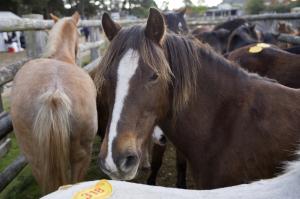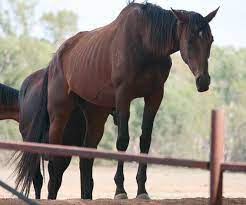Stalling of the ‘Save America’s Forgotten Equines Act’ Keeps the Kill Buying Pipeline Flowing
Few people are aware that America’s horses are being transported across U.S. highways to be slaughtered in Canada and Mexico as a delicacy for foreign diners.
ATLANTA, GEORGIA, UNITED STATES, December 15, 2022/EINPresswire.com/ -- February 2022 was the 20th anniversary of proposed Federal legislation written to protect horses from slaughter for human consumption. With the country quickly approaching its 21st year of efforts to save America’s horses, individuals and organizations saw the Save America’s Forgotten Equines Act of 2021, H.R. 3355, stall in the U.S. House Energy and Commerce Committee because of pro-slaughter efforts. The bill, also known as the S.A.F.E. Act had the required number of co-sponsors needed to pass a full House of Representatives vote. The Act would have passed from the House to the Senate.
Collapse of the bill’s progress continues to keep every equine in America, potentially, one sale away from a kill buyer. Kill buyers, also known as horse meat brokers, purchase equines to transport them to Canadian or Mexican slaughter houses where they sell by the pound. These kill buyers often purchase domestic and wild horses at auctions. Horses advertised as ‘free to good homes’ are sought by kill buyers. They frequently outbid people attending the auction who arrive hoping to purchase a new family horse. The opportunity for the horses to live their lives out safely, with people caring for them and enjoying them, is lost. They spend their last moments in rendering plants. They are terrified by the sounds and smells. Horses may remain fully conscious when slaughter processing begins because of failed attempts to stun them.
Cats, dogs and horses live their lives as companion animals in America. The connection between humankind and horses is long. “Horses change lives. They give our young people confidence and self-esteem. They provide peace and tranquility to troubled souls. They give us hope” - Toni Robinson. Yet, horses are bought in the United States, then sold as meat animals, after they are transported across the border into Canada and Mexico.
Three groups supporting the slaughter of American horses presented letters this summer, all dated May 26, 2022, to the U.S. House Energy and Commerce Committee opposing the S.A.F.E Act. The American Association of Equine Practitioners, the American Veterinary Medical Association and National Tribal Horse Coalition wrote these letters. The S.A.F.E. Act continued to gain Co-Sponsors during the year and move forward despite the letters. That is, until a day or two before September 21st when the bill was scheduled for review in the House Committee Mark-Up Hearing. Supporters of the life saving legislation learned the bill stalled at the last minute.
Readers may learn more by opening the link in this paragraph to read the Wild for Life Foundation Sept 30, 2022, Action Alert. “As we know, the leaders of governmental agencies, as well as large membership groups such as the AVMA, the AAEP and the NTHC, etc., oftentimes do not share, represent, or engage in activities that support the viewpoints and positions of the people they represent. None the less, they are able to control many things through the power that we, or former generations have invested them with.” - Wild for Life Foundation. https://officialsavingamericashorses.blogspot.com/2022/09/action-alert-part-two-safe-act-at-risk.html
“A special interest group can pressure legislators to enact public policies that do not benefit society as a whole. They exert a disproportionate effect on political outcomes”- Lumen Learning. This is the case with the public’s efforts to protect America’s domestic and wild equines from slaughter.
A November 23, 2022 article documents the last days of an American horse, USDA tag #5036, in a Mexican slaughterhouse. The article is titled “An Animal Equality investigation shows American horses in Mexico for slaughter. Additional footage reveals what happens to horses inside Mexican slaughterhouses.” They include a five minute VIDEO clip in their news piece. Open the blue hyperlink below to view.
Excerpts from the piece read, “Animal Equality investigators filmed a horse from the United States with USDA tag number 5036. A veterinarian at the facility was filmed confirming the origin of this horse by saying, ‘5036, which you can read there. He is from the USA.’ Footage shows documentation of how 5036 may have ended up at the slaughterhouse.
The documents show this slaughterhouse receives some of its horses from an auction in Bowie, Texas. Horses from this particular auction are transported across Texas for nearly eight hours. They then cross the border into Mexico in Eagle Pass and travel for more than 9 hours until they arrive at the “Cárnicas de Jerez” slaughterhouse in Zacatecas—a total of 17 hours of travel. These animals are transported to slaughter on trucks designed for smaller animals with shorter necks. This means horses are forced to hold their head down for the duration of travel. With a large number of horses loaded onto the trucks, there is no room for the animals to move. These skittish animals also fight for dominance in cramped spaces. Weaker horses are unable to escape the bites and kicks from more dominant animals and endure injuries during travel.
Horse number 5036 likely endured a similar journey to get to the slaughterhouse, where Animal Equality investigators captured the last images of him. He was slaughtered the day after filming.”
The horse, known only as number 5036 by the time he reached the Mexican slaughter plant, was somebody’s horse before a kill buyer purchased him. Without the Save America’s Forgotten Equines Act, American horse owners cannot safely re-home their horses should the need arise to do so. The S.A.F.E. Act protects horses and, an additional beneficiary, horse owners. From 2001 to 2020, over 1.6 million total horses and other equines were taken across U.S. borders by kill buyers to be slaughtered for their meat.
Cheryl Turner, Founder of 5900 Club, shares her insight into the situation. “Currently, these animals suffer unimaginable and severely inhumane treatment during transportation and slaughter. Surveys show most U.S. citizens oppose horse slaughter. It’s the dark side of America’s horse industry. Horses are being slaughtered for sushi because it’s currently a popular cuisine for foreign diners. Therefore, Congress must step in and propagate laws that govern man's decency.”
Readers are called upon to support this issue by reaching out to their elected officials. Ask lawmakers to support Federal protections to save American equines from the fate of slaughter for human consumption. It only takes a few minutes to make the call and help American wild and domestic horses, burros and donkeys. These links provide their contact information.
https://www.house.gov/representatives
https://www.senate.gov/senators/senators-contact.htm
America’s Secret and Brutal Horsemeat Trade
https://theecologist.org/2013/mar/18/americas-secret-and-brutal-horsemeat-trade
Special Interests
https://courses.lumenlearning.com/suny-fmcc-microeconomics/chapter/special-interest-politics/
Save America’s Forgotten Equines Act
https://www.congress.gov/bill/117th-congress/house-bill/3355/text
5900 Club and American Equine Awareness, an advocacy alliance for public land and wildlife preservation, provided this news piece.
Donna Brorein, AEA Advocacy News
American Equine Awareness
+1 770-870-7589
email us here
Legal Disclaimer:
EIN Presswire provides this news content "as is" without warranty of any kind. We do not accept any responsibility or liability for the accuracy, content, images, videos, licenses, completeness, legality, or reliability of the information contained in this article. If you have any complaints or copyright issues related to this article, kindly contact the author above.



